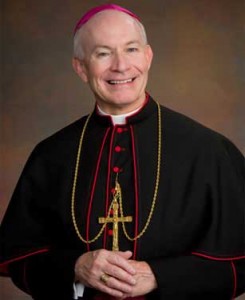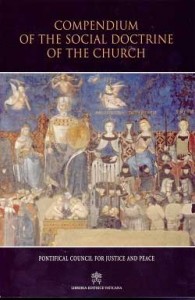USCCA37 Â Chapter 29 part 3 – The Death Penalty and War
[powerpress]
Archbishop Lucas offers insights on the US Catholic Catechism for Adults Chapter 29:
The Death Penalty
Following the lead of Pope John Paul II’s The Gospel of Life, the Catechism teaches that governmental authority has the right and duty to assure the safety of society, and to punish criminals by means of suitable penalties. This includes imposition of the death penalty if there is no other way to protect society (cf. CCC, no. 2267). But this principle has a very restrictive application:
If, however, non-lethal means are sufficient to defend and protect people’s safety from the aggressor, authority will limit itself to such means, as these are more in keeping with the concrete conditions of the common good and more in conformity with the dignity of the human person. Today, in fact, as a consequence of the possibilities which the state has for effectively preventing crime, by rendering one who has committed an offense incapable of doing harm—without definitively taking away from him the possibility of redeeming himself—the cases in which the execution of the offender is an absolute necessity “are very rare, if not practically non-existent.†(CCC, no. 2267, citing EV, no. 56)
When dwelling on legal and moral arguments concerning the death penalty, we should do so not with vengeance and anger in our hearts, but with the compassion and mercy of our Lord in mind. It is also important to remember that penalties imposed on criminals always need to allow for the possibility of the criminal to show regret for the evil committed and to change his or her life for the better.
The imposition of the death penalty does not always allow for one or both of the purposes of criminal punishment to be achieved. “Our nation’s increasing reliance on the death penalty cannot be justified. We do not teach that killing is wrong by killing those who kill others. Pope John Paul II has said the penalty of death is ‘both cruel and unnecessary’ (Homily in St. Louis, January 27, 1999). The antidote to violence is not more violence†(USCCB, Faithful Citizenship [Washington, DC: USCCB, 2003], 19). (more…)
Tags: common good, death, evil, USCCB
This entry was posted on Monday, June 24th, 2013 at 9:27 am
You can follow any responses to this entry through the RSS 2.0 feed.
Episode 26- Regnum Novum: Bringing forth the New Evangelization through Catholic Social Teaching with Omar Gutierrez – We continue the study of the “Compendium of the Social Doctrine of the Church” Â Chapter 4 Section 1
– We continue the study of the “Compendium of the Social Doctrine of the Church” Â Chapter 4 Section 1
[powerpress]
CHAPTER FOUR
PRINCIPLES OF THE CHURCH’S SOCIAL DOCTRINE
II. THE PRINCIPLE OF THE COMMON GOOD
a. Meaning and primary implications
b. Responsibility of everyone for the common good
c. Tasks of the political community
III. THE UNIVERSAL DESTINATION OF GOODS
a. Origin and meaning
b. The universal destination of goods and private property
c. The universal destination of goods and the preferential option for the poor

We live at a very special time. The confluence of many things has brought forth the clear need to be able to articulate the Social Teaching of the Catholic Church in a way that is accessible and applicable. This is not to be an effort where high-minded theories are to be bandied about. Rather, this is a time of opportunity wherein we can apply the Social Doctrine to the concrete so as to bring about a New Kingdom, a Revolution. – Omar G.
Also visit Omar’s “Discerning Hearts” page Catholic Social Teaching 101
Tags: catholic social teaching, common good, compendium of the social doctrine of the church, New Kingdom, social doctrine, special time
This entry was posted on Tuesday, December 4th, 2012 at 7:53 am
You can follow any responses to this entry through the RSS 2.0 feed.
Episode 7 – Regnum Novum: Bringing forth the New Evangelization through Catholic Social Teaching with Omar Guiterrez – Value 5 The Common Good, Universal Destination of Goods, Subsidiarity, Participation, Solidarity part 1
– Value 5 The Common Good, Universal Destination of Goods, Subsidiarity, Participation, Solidarity part 1
[powerpress]
These are the five principles laid out in the Compendium of the Social Doctrine of the Church. If we understand these principles, then the work of the Revolution can begin. We are made now for a New Kingdom with Christ as our King in all things. Let us discover this place together, and make the devil cringe and know the suffering of defeat. “Love”
Discerning Hearts is blessed to present Omar F. A. Guiterrez, M.A. , Special Assistant to Archbishop George Lucas of the Archdiocese of Omaha, in a groundbreaking series which breaks open the heart of Catholic Social Doctrine.
We encourage you to visit “Regnum Novum – A New Kingdom: A Revolution” Omar Guiterrez’s blog site
 We live at a very special time. The confluence of many things has brought forth the clear need to be able to articulate the Social Teaching of the Catholic Church in a way that is accessible and applicable. This is not to be an effort where high-minded theories are to be bandied about. Rather, this is a time of opportunity wherein we can apply the Social Doctrine to the concrete so as to bring about a New Kingdom, a Revolution. – Omar G. from Regnum Novum
We live at a very special time. The confluence of many things has brought forth the clear need to be able to articulate the Social Teaching of the Catholic Church in a way that is accessible and applicable. This is not to be an effort where high-minded theories are to be bandied about. Rather, this is a time of opportunity wherein we can apply the Social Doctrine to the concrete so as to bring about a New Kingdom, a Revolution. – Omar G. from Regnum Novum
From episode 7… Point 5: The Common Good, Universal Destination of Goods, Subsidiarity, Participation, Solidarity
These are the five principles laid out in the Compendium of the Social Doctrine of the Church. If we understand these principles, then the work of the Revolution can begin. We are made now for a New Kingdom with Christ as our King in all things. Let us discover this place together, and make the devil cringe and know the suffering of defeat.
In this episode we focus on “The Common Good”.
Also visit Omar’s “Discerning Hearts” page Catholic Social Teaching 101
Tags: archdiocese of omaha, catholic, catholic podcast, catholic prayer, catholic social doctrine, cathollc spirituality, common good, compendium of the social doctrine of the church, new evangelization, social teaching of the catholic church
This entry was posted on Monday, April 25th, 2011 at 10:23 am
You can follow any responses to this entry through the RSS 2.0 feed.
